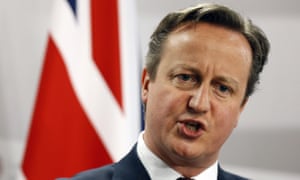
PM to set out government’s five-year strategy, saying: ‘There are people born and raised in this country who don’t really identify with Britain’
People must challenge the view that people become radicalised because of historic injustices, recent wars, poverty or hardship, David Cameron will say, describing such arguments as “grievance justification”.
In a keynote speech in Birmingham on Monday, the prime minister will set out the government’s five-year strategy for tackling extremist ideology, describing it as “struggle of our generation”.
Cameron will say “the root cause of the threat we face is the extremist ideology itself,” arguing that we need first to understand what makes Islamist extremism so attractive to people in order to prevent it.
The Home Secretary, Theresa May, said ahead of the speech on Monday that the strategy would include new legislation likely to include powers to take action against individuals or groups who are considered to be espousing extremist views. She denied it would constitute an attack on freedom of speech.
“We’re not talking about curbing free speech,” she said. “We recognise that free speech is one of our values … but what we are saying is that we have to look at the impact that some people have in terms of the poisonous ideology that they are trying to implant in people’s minds,” she told the BBC Radio 4 Today programme.
The prime minister will also use his speech to announce that Louise Casey, the head of the government’s troubled families unit, will chair a review of how to boost opportunity and integration in the most isolated and deprived communities.
“When people say: ‘It’s because of the involvement in the Iraq war that people are attacking the west,’ we should remind them: 9/11 – the biggest loss of life of British citizens in a terrorist attack – happened before the Iraq war,” Cameron will say.
“When they say that these are wronged Muslims getting revenge on their western wrongdoers, let’s remind them: from Kosovo to Somalia, countries like Britain have stepped in to save Muslim people from massacres. It’s groups like [Islamic State], al-Qaida and Boko Haram that are the ones murdering Muslims.”
He will continue: “Others might say: it’s because terrorists are driven to their actions by poverty. But that ignores the fact that many of these terrorists have had the full advantages of prosperous families and a western university education.
“I am not saying these issues aren’t important. But let’s not delude ourselves. We could deal with all these issues – and some people in our country and elsewhere would still be drawn to Islamist extremism.”
According to Mark Rowley, the Metropolitan police assistant commissioner, at least 700 Britons have travelled to Syria and over half have since returned home, where they now pose a significant terrorism threat.
The prime minister will set out what he sees as the four main reasons that people become radicalised:
- Extremism can seem exciting, especially to young people.
- People can be drawn from non-violent extremism to violent extremism.
- Extremists are overpowering other voices within Muslim debate.
- Failures of integration allow extremist ideas to gain traction.
As part of the new integration review, Casey will look at issues such as how to ensure people learn English, how to boost women’s employment outcomes and how state agencies can work with communities to promote integration and opportunity.
Cameron is expected to say that the government must learn lessons from past mistakes, “when funding was simply handed over to self-appointed ‘community leaders’ who sometimes used it in a divisive way”.
http://www.theguardian.com/politics/2015/jul/20/extremist-ideology-struggle-generation-david-cameron

No comments:
Post a Comment